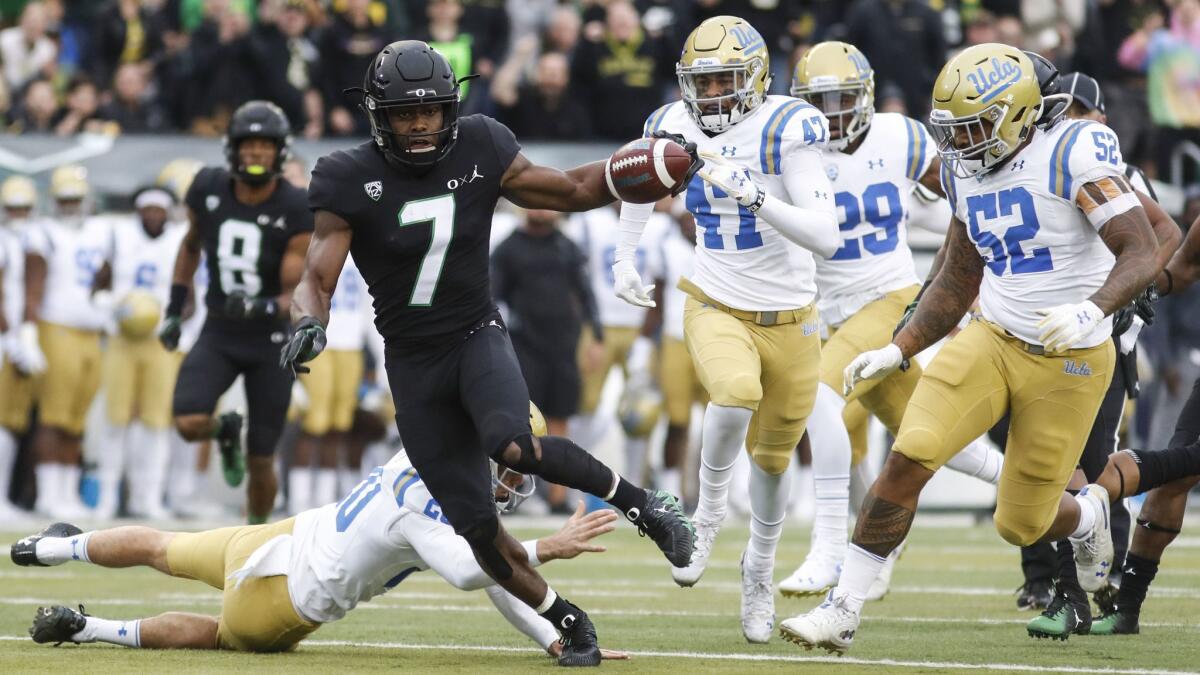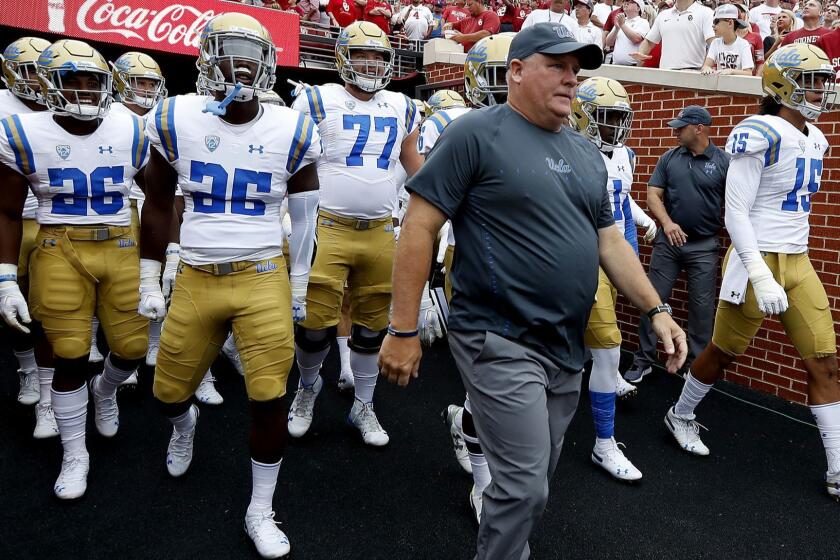UCLA seeks better effort and efficiency on special teams

- Share via
Breakdowns by UCLA’s special teams led to three touchdowns for Oregon last November, part of a season-long trend.
Nine months later, a simplified approach on special teams apparently has made things as easy as one, two, three.
“If you can count one to three, A, B, C,” defensive back Jay Shaw said Sunday, “you already know what you’re doing.”
The Bruins’ overhaul of special teams began in January when tight ends coach Derek Sage was also made their special teams coordinator after the departure of Roy Manning, who now coaches cornerbacks at Oklahoma.
Sage has never previously held the title of special teams coach or coordinator, though UCLA coach Chip Kelly said Sage worked with special teams during his four seasons as the receivers coach at Wyoming.
“He’s done it before, and he was really good at it,” Kelly said. “We discussed and looked at candidates, and we had a really good candidate in-house, so that’s what we did.”
Kelly noted that almost every other assistant coach contributes to the special teams under Sage’s direction.
Players have praised Sage for his attention to detail. He starts meetings by asking players to clap in sync, and if the energy is not sufficient, everyone must repeat the process. Running back Martell Irby said players are taught how to contribute to returns even on plays in which they get beat by their counterparts.
Sign up for our free sports newsletter >>
UCLA didn’t get many details right last season. The Bruins fumbled a punt return, gave up a punt return for a touchdown and failed to stop a fake field-goal try … and that was just against Oregon. There were also failed onside kicks, a field-goal try that went awry after kicker J.J. Molson ran onto the field late, and two other field-goal attempts that fell just short after false-start penalties pushed UCLA back five yards.
The Bruins ranked ninth in the Pac-12 Conference in net punting (37.2 yards per kick) and last in kickoff coverage (netting 38.3 yards per kickoff). Molson made 14 of 19 field goals, giving UCLA a 73.7% success rate that ranked fifth in the conference.
Heading into the season opener against Cincinnati on Aug. 29, special teams are receiving a heightened focus.
“We know that special teams is one-third of the game, and we’re really going to treat it like that,” long snapper Johnny Den Bleyker said. “So we’re taking a lot of time in meetings to emphasize things, emphasize drill work, emphasize film. If a guy makes a mistake, we’re going to point it out, we’re going to correct it.”
College admissions scandal: A $100,000 bribe and help from Rick Singer got him a soccer scholarship to UCLA. But he didn’t play.
One aspect of UCLA’s special teams that Kelly does not appear intent on changing is its lack of kickoff returns. The Bruins returned only nine kickoffs in 12 games last season, fewest in the Pac-12. The returners regularly signaled for fair catches under a rule that allowed their team to start possessions at the 25-yard line.
“If they’re going to give it to you on the 25,” Kelly said, “then take it on the 25.”
A healthy outlook
While a handful of players have worn yellow jerseys during training camp to signify they were recovering from injuries, Kelly said he was pleased with the team’s relatively good health.
Strength coaches told Kelly that the team has had between 92% and 96% of the roster available to practice each day.
“That’s outstanding,” Kelly said. “You get that many guys participating every day, that’s really good.”
UCLA football coach Chip Kelly is as guarded about his sports science program as he is about his playbook, refusing to divulge any specifics, but his players rave about the impact of the team’s nutrition, sleep and recovery efforts.
Kelly said the avoidance of widespread injuries was largely a reflection of the work of football performance coordinator Frank Wintrich.
“I really think the biggest thing from an injury standpoint is the soft-tissue injuries,” Kelly said, “and real credit goes to Frank and his staff for that.”
Eight players remained limited in their participation Sunday. Kelly said cornerback Darnay Holmes was day to day with an unspecified injury. Left tackle Alec Anderson returned after he underwent leg surgery this past week, though he was limited to riding an exercise bike and stretching during the portion of practice open to the media.
Running back Joshua Kelley, guard Sam Marrazzo and wide receivers Theo Howard, Dymond Lee and Ashton Authement were also wearing yellow jerseys to reflect they were off limits from contact. Linebacker Tyree Thompson remained absent after recently undergoing foot surgery.
Honoring the past
Loud clapping could be heard on the field after the final practice play Sunday.
It was a celebration honoring walk-on wide receiver Ethan Fernea, who will wear No. 36 this season as a tribute to the late Nick Pasquale. Fernea was given the number worn by the onetime walk-on receiver who was fatally struck by a car in September 2013, becoming the first UCLA player to wear it since the tragedy.
“He’s just coming in with energy every day,” Shaw said of Fernea. “Like me going against him, I know no matter what, he’s going to try to do his job whether it’s blocking, running a route or just whatever you ask for him, he’s just going to do it. Smile-on-his-face type of guy.”
More to Read
Go beyond the scoreboard
Get the latest on L.A.'s teams in the daily Sports Report newsletter.
You may occasionally receive promotional content from the Los Angeles Times.








